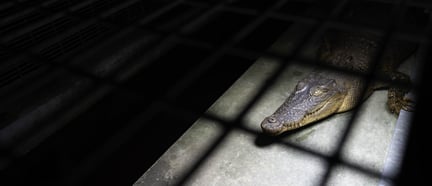
8 luxury fashion brands you didn’t know were ethical
News
Over the last five years, the number of high-end fashion brands embracing ethical materials has soared. Here are eight high fashion brands that have committed to banning both fur and skins from their lines fur-ever.
The catwalk has a new concept: Pain is not beauty. Ditching the fur and skins of wild animals in designer lines is now seen as the future of fashion – it’s kind, sustainable, innovative and fantastic news for wild animals.
1. Calvin Klein
Way ahead of the curve, Calvin Klein was a pioneer in banning fur from its lines in 1994. The fashion giant – now owned by PVH, which also owns Tommy Hilfiger – also said goodbye to using wild animal skins in 2020.
A statement on the PVH website says:
Our Calvin Klein business has always rallied around bold and progressive ideals. We will build a business with zero tolerance for injustice, where fashion has nothing to hide.
2. Chanel
This famous French fashion house was one of the first luxury brands to ban wild animal skins in 2018, including from crocodiles, lizards, snakes and stingrays. It decided fur was out of fashion at the same time, and banned it, too.
Bruno Pavlovsky, president of Chanel, hinted at the creative opportunities afforded by switching to cruelty-free textiles, in this statement from 2018:
The future of high-end products will come from the know-how of what our atelier is able to do… We did it because it’s in the air, but it’s not an air people imposed on us. It’s a free choice.
3. Diane Von Furstenberg
You’ve probably heard of the wrap dress – it’s an iconic design from Belgian-American designer DVF. As timeless and elegant as this dress is, the brand has a new top contender for the best decision it’s ever made.
In 2018, Ms. Furstenberg decided compassion comes first. The company decided to ban the use of fur, wild animal skins, mohair and angora in its collections.
Sandra Campos, DVF's Chief Executive Officer said:
It’s time for us to make this change and accept responsibility to ensure that we don’t promote killing animals for the sake of fashion. We are committed to supporting the shift to a more ethical and sustainable fashion industry by providing the consumer with innovative and sophisticated alternatives.
Animals like crocodiles suffer for the fashion industry
4. Jean Paul Gaultier
Affectionately dubbed ‘L’Enfant terrible’ (or ‘terrifying child’) for his quirky tastes - this is the man who invented Madonna’s pointy cone bra, after all - there’s nothing truly terrifying about this fashionista.
The Jean Paul Gaultier company, owned by Spanish company Puig, banned fur in 2018, and skins from animals like snakes and crocodiles in 2021. The designer has gone on record saying the industry’s use of fur is “absolutely deplorable.” While he retired in 2020, this is just another part of Gaultier’s legacy he can be proud of.
5. Stella McCartney
Cruelty-free company Stella McCartney has been proudly fur, leather and skin free since launching in 2001. McCartney is a lifelong vegetarian, and her company’s ethos to be responsible, honest and sustainable is consistent with her values of protecting animals. The designer has commented:
Real fur is extraordinarily old-fashioned. It’s not relevant, it’s not sexy, it’s not fashionable, and it’s not cool. Our Fur-Free Fur looks and feels luxurious, and is completely animal-free.
6. Tommy Hilfiger
Describing its design style as ‘preppy with a twist,’ this classic American brand may still have red in its blue, red and white logo, but no animals bleed for its fashion products.
The company, which is owned by PVH Corp, stopped showcasing fur in 2007, and banned wild animal skins in 2020 – including crocodiles, alligators, snakes, lizards, marine animals, kangaroos, ostriches and emus. A company spokesperson said this after announcing the brand’s decision:
At Tommy Hilfiger, we have always [taken] and will always take the environment, human rights, our community and related subjects very seriously, which is why we have vowed to not use fur or skins in any of our collections.
7. Victoria Beckham
The English fashion house has been fur-free since its launch in 2008 and hasn’t used wild animal skins in its collections since 2019, including from alligators, crocodiles, ostriches and snakes. Here is what a brand spokesperson said about the decision:
As a business, we have been looking to action the use of more ethically sourced products that have less environmental impact for some time.
We are happy to confirm that we will cease using skins in all future collections as of our main autumn/winter 2019 ready-to-wear presentation. This decision reflects the wishes of not only the brand, but also that of our customers.
8. Vivienne Westwood
A pioneer of punk rock style, the Vivienne Westwood brand has historically embraced the spirit of challenging the status quo for a cause. When the designer first learned of the cruelty behind fur in 2007 discussions with PETA, she made the decision to ban fur on the spot. The company has since also stopped using wild animal skins in its lines.
Vivienne Westwood was one of eight UK designers who co-wrote a letter addressed to the country's Prime Minister Boris Johnson, urging him to ban fur sales nation-wide.
Their letter states:
Our fur-free policies are informed by the beliefs and expectations of the majority of UK consumers, who reject animal fur on ethical grounds.
We’re proud to support the growing fur-free movement… We know that the majority of British consumers want fashion items without fur.
A kinder, more humane, environmentally responsible and safer fashion industry is not only possible but exciting, creative and inevitable.
Wildlife free fashion
Wildlife trade
Right now, millions of wild animals are being captured, abused, bred, and mercilessly slaughtered so that the fashion industry can maximise their profit.
End animal cruelty in the fashion industry
Pledge to not purchase, wear or promote any wild animal skins, feathers, or wild animal fur products.

 Minks are farmed for their fur for the fashion industry. Credit: JoAnne McArthur / We Animals Media
Minks are farmed for their fur for the fashion industry. Credit: JoAnne McArthur / We Animals Media
